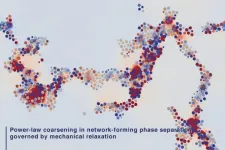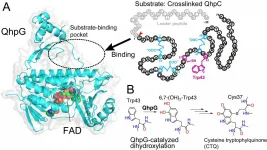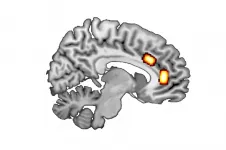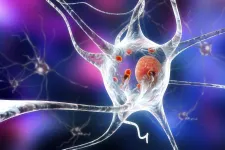Why Black men's prostate cancer may be more responsive to immunotherapy
Discovery paves way to precision medicine for prostate cancer in all races
2021-02-10
(Press-News.org) Increased level of plasma cells linked to improved cancer survival
1,300 prostate tumor samples studied
Immunotherapy-based precision medicine clinical trials being developed
CHICAGO--- Black men die more often of prostate cancer yet, paradoxically, have greater survival benefits from immunotherapy treatment. A new Northwestern Medicine study discovered the reason appears to be an increase of a surprising type of immune cell in the tumor. The findings could lead to immune-based precision medicine treatment for men of all races with localized aggressive and advanced prostate cancer.
In the new study, Northwestern scientists showed tumors from Black men and men of African ancestry have an increased proportion of a special immune cell called plasma cells compared to the tumors of white men. A research team lead by Dr. Edward Schaeffer, chair of urology at Northwestern University Feinberg School of Medicine and Northwestern Medicine, found this increase in plasma cells correlated with improved cancer survival following surgery and identify plasma cells as potential drivers of prostate cancer immune-responsiveness.
The study will be published on Feb. 10 in Nature Communications.
"If a man's prostate cancer has numerous plasma cells, we found he had improved cancer survival," Schaeffer said. "Our study suggests plasma cells are important in the body's response to cancer."
Although recent research suggests Black men with advanced prostate cancer have improved survival outcomes with immunotherapy, there has been no way to predict which individual patients -- Black or white -- with prostate cancer may respond best to immunotherapy drugs.
Schaeffer's team explored this by analyzing the genomics of 1,300 tumor samples annotated with self-identified race or genetic ancestry. They found, on average, more plasma cells in Black men's tumors than white men's.
The finding was not unique to Black men, and the work showed that in all men with elevated plasma cell levels there was improved cancer-free survival following surgery.
"The finding comes at a time as researchers are discovering plasma cells may play a greater role in cancer immunotherapy than previously thought," said first author Dr. Adam Weiner, a Northwestern Medicine urology resident. "Testing for plasma cells in prostate cancer may help identify men who will benefit from immune-based treatments."
Schaeffer's research team at the Polsky Urologic Cancer Institute at the Robert H. Lurie Comprehensive Center of Northwestern University is now developing immunotherapy-based precision medicine clinical trials to investigate whether increased levels of plasma cells in prostate cancers from men of all races and ancestry can enhance the efficacy of immunotherapy and improved survival.
Prostate cancer is the second most common cancer in American men with an estimated 175,000 new cases every year and about 32,000 deaths. The severity and resulting mortality from prostate cancer are about two times greater in patients of African American origin.
Identification and characterization of effective therapeutic targets is a significant and unmet need to improve clinical outcomes and reduce mortality from lethal prostate cancer among African American men.
INFORMATION:
The research was supported by the Polsky Urologic Cancer Institute, grant 5U01CA196390 from National Cancer Institute of the National Institutes of Health, the Prostate Cancer Foundation, the 2019 Urology Care Foundation Residency Research Award Program and the Russell Scott, Jr., MD Urology Research Fund.
ELSE PRESS RELEASES FROM THIS DATE:
2021-02-10
CHAMPAIGN, Ill. -- When modified using a process known as epoxidation, two naturally occurring lipids are converted into potent agents that target multiple cannabinoid receptors in neurons, interrupting pathways that promote pain and inflammation, researchers report. These modified compounds, called epo-NA5HT and epo-NADA, have much more powerful effects than the molecules from which they are derived, which also regulate pain and inflammation.
Reported in the journal Nature Communications, the study opens a new avenue of research in the effort to find alternatives to potentially addictive opioid pain killers, researchers say.
The ...
2021-02-10
Tokyo, Japan - Researchers from Institute of Industrial Science at The University of Tokyo investigated the mechanism of phase separation into the two phases with very different particle mobilities using computer simulations. They found that slow dynamics of complex connected networks control the rate of demixing, which can assist in the design of new functional porous materials, like lithium-ion batteries.
According to the old adage, oil and water don't mix. If you try to do it anyway, you will see the fascinating process of phase separation, in which the two immiscible liquids spontaneously "demix." In this case, the minority phase always forms droplets. Contrary to this, the researchers ...
2021-02-10
Osaka, Japan - Investigators from the Institute of Scientific and Industrial Research at Osaka University, together with Hiroshima Institute of Technology, have announced the discovery of a new protein that allows an organism to conduct an initial and essential step in converting amino acid residues on a crosslinked polypeptide into an enzyme cofactor. This research may lead to a better understanding of the biochemistry underlying catalysis in cells.
Every living cell is constantly pulsing with an array of biochemical reactions. The rates of these reactions are controlled by special proteins called enzymes, which catalyze specific processes that would otherwise take much longer. A number of enzymes require specialized molecules called "cofactors," which can help shuttle electrons ...
2021-02-10
As indicated by other studies, different parts of the brain are responsible for different types of decisions. A research team led by Luca Franziska Kaiser and Prof. Dr. Gerhard Jocham from the HHU working group 'Biological Psychology of Decision Making', and Dr. Theo Gruendler together with colleagues in Magdeburg analysed the balance of the messenger substances GABA and glutamate in two forms of decision-making. The background to the research was to find out how different concentrations of these substances influence the person making the decision.
On the one hand, the researchers looked at 'reward-based decisions', which involve maximising reward by selecting the better of two ...
2021-02-10
It is now possible to capture images of planets that could potentially sustain life around nearby stars, thanks to advances reported by an international team of astronomers in the journal Nature Communications.
Using a newly developed system for mid-infrared exoplanet imaging, in combination with a very long observation time, the study's authors say they can now use ground-based telescopes to directly capture images of planets about three times the size of Earth within the habitable zones of nearby stars.
Efforts to directly image exoplanets - planets outside our solar system - have been hamstrung by technological limitations, resulting in a bias toward the detection of easier-to-see planets that are much larger than Jupiter and are located around very young stars and far outside the ...
2021-02-10
A study published in Nature Communications today (Wednesday 10 February) presents a compelling new evidence about what a key protein called alpha-synuclein actually does in neurons in the brain.
Dr Giuliana Fusco, Research Fellow at St John's College, University of Cambridge, and lead author of the paper, said: "This study could unlock more information about this debilitating neurodegenerative disorder that can leave people unable to walk and talk. If we want to cure Parkinson's, first we need to understand the function of alpha-synuclein, a protein present in everyone's brains. ...
2021-02-10
While deforestation levels have decreased significantly since the turn of the 21st century, the United Nations (UN) estimates that 10 million hectares of trees have been felled in each of the last five years.
Aside from their vital role in absorbing CO2 from the air, forests play an integral part in maintaining the delicate ecosystems that cover our planet.
Efforts are now underway across the world to rectify the mistakes of the past, with the UN Strategic Plan for Forests setting out the objective for an increase in global forest coverage by 3% by 2030.
With time being of the essence, one of the most popular methods of reforestation in humid, tropical regions ...
2021-02-10
Commuters now have yet another reason to avoid packing themselves into subway stations. New York City's transit system exposes riders to more inhaled pollutants than any other metropolitan subway system in the Northeastern United States, a new study finds. Yet even its "cleaner" neighbors struggle with enough toxins to give health-conscious travelers pause.
Led by NYU Grossman School of Medicine researchers, the study measured air quality samples in 71 stations at morning and evening rush hours in Boston, New York City, Philadelphia, and Washington, D.C. ...
2021-02-10
A treatment, known as KEDRAB (Rabies Immune Globulin [Human]), currently used in the prevention of rabies has been demonstrated to be safe and effective for patients age 17 and under.
Results published today in Human Vaccines & Immunotherapeutics report the first and only pediatric trial of any human rabies immunoglobulin (HRIG) currently available in the US. Findings have been submitted to the US Food and Drug Administration for review.
In the United States, someone is treated for possible exposure to rabies every 10 minutes. Globally, the World ...
2021-02-10
A new paper in Oxford Open Immunology, published by Oxford University Press, examines prior findings in the field of neuroimmunology that suggest potential treatment strategies for patients suffering long-term symptoms from COVID-19.
Though COVID-19 was initially believed to be a short-term illness, lasting between one and three weeks, it's clear that a substantial number of patients will experience symptoms beyond that, with some patients suffering from health problems for more 12 weeks. In fact, for patients who were initially hospitalized, more than 80% reported at least one symptom that persisted beyond the first month.
The symptoms of long-COVID can vary widely, ...
LAST 30 PRESS RELEASES:
[Press-News.org] Why Black men's prostate cancer may be more responsive to immunotherapy
Discovery paves way to precision medicine for prostate cancer in all races





